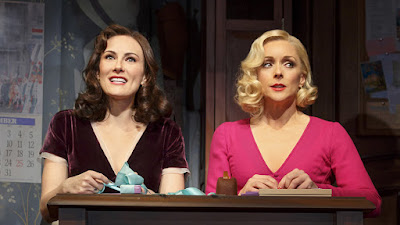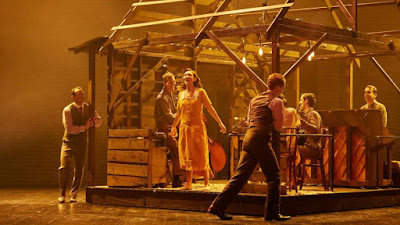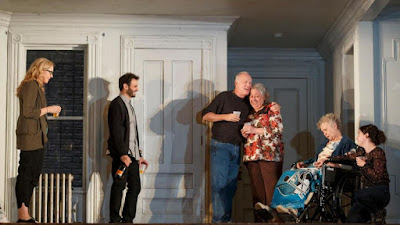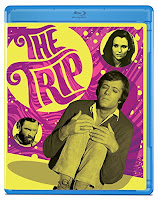- Details
-
Parent Category: Film and the Arts
-
Category: Reviews
-
Published on Wednesday, 23 March 2016 00:47
-
Written by Kevin Filipski
Blu-rays of the Week
The Big Sleep
Key Largo
(Warner Archive)
Hollywood glamour couple Bogie and Bacall were together onscreen and off from 1945 until Humphrey Bogart's 1957 death from cancer, and these classics show them at their tough but tender best, with their undeniable chemistry on display in Howard Hawks' 1946 The Big Sleep, the best Dashiell Hammett adaptation, Bogart's iconic Sam Spade falling for Lauren Bacall's unhappy wife, and director John Huston's taut 1948 Key Largo, with B&B well-supported by Edward G. Robinson, Lionel Barrymore and Claire Trevor's Oscar-winning turn as an abused gangster's moll.
Both B&W films look splendid on Blu; Sleep extras are an alternate cut of the film with an intro and comparison.
Rage of Honor
(Arrow)
One of the best mid-70s buddy teams was Pam Grier and Margaret Markov, together for the 1973 prison B-movie Black Mama, but also in the next year's The Arena (when is that finally out on Blu?): Mama is nothing special, but its real virtues are Grier and Markov. Too bad that (as she says in a new, included interview) Markov retired shortly after when she married Mama's producer.
Rage, the 1986 sequel to the equally tepid Pray for Death, is another rote martial-arts flick starring Sho Kosugi, who shows as little charisma as he did in the original. Genre fans may like it, though. Both films have good, grainy transfers; extras include interviews and featurettes.
The Hunger Games: Mockingjay, Part 2
(Lionsgate)
Four lengthy films later, The Hunger Games finally ends, and if the enterprise's self-importance rarely allows those who hadn't read Suzanne Collins's original novels to enter their insular futuristic world of rebellion, there is one reason to watch: Jennifer Lawrence.
This extraordinarily empathetic actress makes everything (even Joy) worth sitting through, and her presence makes this jumbled, dour, overlong third sequel less than risible. There are entertaining bits by Woody Harrelson, Natalie Dormer, Julianne Moore and Donald Sutherland, but it's Lawrence's show all the way. The film has an excellent hi-def transfer; extras include a commentary and an eight-part making-of doc.
(Olive Films)
The last film directed by Don Siegel (Invasion of the Body Snatchers, The Shootist) was a 1982 adaptation of a Frank D. Gilroy novel that's a mishmash of farce, road movie, Bette Midler musical numbers and an implausible murderous plot that never coheres, despite a few genuinely amusing moments.
Most of those are provided by Rip Torn, gloriously sleazy as Midler's sugar daddy, and Midler's impeccable comic timing. But the reported bumpiness of the production—both Siegel and co-star Ken Wahl reportedly disliked Midler, and vice-versa—unfortunately shows up onscreen in spades, jinxing the whole enterprise. The new hi-def transfer is solid, with good grain.
(Olive Films)
Jack Nicholson, of all people, scripted this psychedelic mess by director Roger Corman, an attempt to chronicle the "tune in turn out" Summer of Love in 1967: Peter Fonda plays a director given LSD by friend Bruce Dern to help expand his creative mind, but all it does is give him anxiety over his recurring, mind-blowing "trips."
There's rudimentary visualizing of acid trips with quick cuts, blasting music, exaggerated settings and dream-like, woozy kaleidoscopic colors, but there's little here unless one is a fan of Fonda, Dern, Dennis Hopper or Corman himself. The bright hi-def transfer looks authentically trippy.
(Warner Archive)
In Alfred Hitchcock's most straightforward drama, Henry Fonda plays an innocent musician taken into custody when witnesses finger him as an armed robber: based on a true story, this 1952 drama shows that Hitchcock could spin tension out of any kind of material.
Fonda, typically understated, is nicely complemented by Vera Miles as a wife who loses her bearings once her husband is accused. On Warner Archive's first-rate Blu-ray transfer, the black and white compositions have an authentically grainy look; lone extra is a making-of featurette.
40 Love
(First Run)
The continually shifting dynamics of a modern family are on display in this acute psychological study of a father with employment difficulties, a wife with her own issues and an 11-year-old son with a passion (and talent) for tennis.
Director Stephane Demoustier's precisely observed drama is beautifully acted, and his shrewd script leads to a devastating twist ending that further illuminating his characters' behavior.
The Spoils of Babylon—Complete 1st Season
(Anchor Bay)
A mildly amusing satire of grandly self-important television dramas, this IFC mini-series is too late to the party: parodying the likes of Rich Man Poor Man, among many others, is just too dated and scattershot to be consistently funny, and its huge cast follows suit.
For every priceless comic turn by Tim Robbins, Michael Sheen or Val Kilmer, there are misfired appearances by Tobey McGuire, Kristen Wiig and Will Farrell. Of course, if you enjoy such obvious parody, then your mileage will vary.
(First Run)
The invasion of a small North Dakota town by white supremacists—and how citizens fought back—is fascinatingly recounted by Michael Beach Nichols and Christopher K. Walker's documentary, which plays as a cautionary tale, a horrifying look at our new reality and even a mesmerizing thriller in which the outcome is in doubt.
Led by Craig Cobb, "nationalists" attempt to take over, while those already there—including an interracial couple next door to Cobb's property—try to make sure it doesn't happen. In the supposed post-racial age of Obama (not to mention the rise of Trump), this is necessary viewing. Extras are an extended and deleted scene and an interview.




















